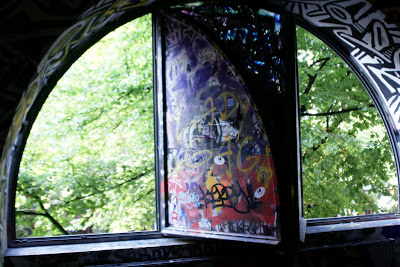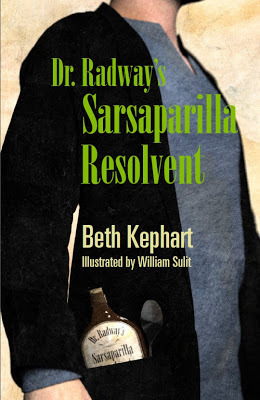Beth Kephart's Blog, page 135
April 21, 2013
sometimes it just feels like this, and you feel sad, and yet you know

that it is time, it is becoming time, to quietly step away from something you've loved.
it is important to be peaceful.
it is important to be kind.




Published on April 21, 2013 15:04
my niece dances the tango, at Yale University
I could talk about how she is a physicist, a math genius, a girl who could solve most quantitative puzzles somebody smarter than me would toss her way, from a very young age. A girl who was the named the top girl scientist in the state of New York when she graduated from high school. A girl who spent a summer in California calculating stars.
But this is what makes me happiest about my niece, now a sophomore at Yale University. She has found something she genuinely loves. And it's dance. And she's so good at it.
Here she is, dancing the tango, at the spring show.
And here, below, is the team captain. Something else, right?




Published on April 21, 2013 04:07
April 19, 2013
saying happy birthday to Tamra, because remembering each other is what we still do best

On a day that has us bewildered, at the end of a week that has broken our hearts, there are still the small things we can and must do. Kind things because most of us are kind. Thoughtful things, because we need each other.
Today is Tamra Tuller's birthday. She is my editor, now at Chronicle Books. She brought Small Damages into the world, she is launching We Could Be Heroes, and we are at work on a new book.
But that's not why I love her. I love her because I love her. Because we have the greatest conversation going, because we know and trust each other, because she is dear. I hope, Tamra, that today and this year yield their gifts to you. Every gift you want, may it be yours.




Published on April 19, 2013 09:45
April 18, 2013
what parts of our history do we save? (remnants of a magazine/newspaper career)

My husband, now returned from his trip home, to El Salvador, returns with stories of his childhood, recovered and retold over meals with families and friends. I wrote his stories once, or the ones I knew, in a book called Still Love in Strange Places. But the past, in El Salvador, is always present.
There was much to do while Bill was gone. On the list was my need to respond to his hope that I might find a way to eliminate all the "unnecessary" clippings of my previous magazine/newspaper writing life. Philadelphia Magazine, Wall Street Journal Europe, Chicago Tribune, Philadelphia Inquirer, New York Times, Washington Post, Real Simple, Parenting, Offspring, Madison, New Jersey Life, Book Magazine, Family Circle, Organic Style, Blue Ridge Magazine, Pennsylvania Gazette—even tucked away inside two boxes, there was too much of too much. Perhaps, he hoped, I would cut the piles by half.
And so on Sunday afternoon I began—sifting, sorting, tossing, trying to decide which stories of my past were worthy of space in a cramped, two-bedroom home. Would I ever really read any of these pieces again? Wasn't the act of making them (the pitching, the interviews, the writing, the editing) somehow more sacred than the printed pieces themselves? Why was I having such a hard time filling the recycling bin with molting paper? It was, after all, molting paper.
I kept, in the end, the stories that meant the most to me then—the El Salvador photo spread, the interview with Gerald Stern, the Oksana Baiul profile, just a few reviews, here and there, from a lifetime of intense reviewing. I kept a story about swimming, a story about creativity, a story about forgiveness, stories about being a mom. I kept what is there, on the table above, and tried not to think about the temporary nature of so many things. Too many things.
There were stories. I wrote them. They were.




Published on April 18, 2013 12:16
April 17, 2013
walking West Philadelphia with the incredible documentary photographer, Lori Waselchuk

Eight years ago I was honored by a Pew Fellowship in the Arts grant. It was a gift of time; it was also a gift of hope. I was working on that odd Schuylkill River book (Flow)—the book no one got, the book no one could label. I was given the chance to keep working on those prose poems/narratives/not fictions and to find them an eventual home (Temple University Press) and then to go out into the world and meet those open-hearted readers who didn't give a whit if the book could not, for the life of itself, conform to a category.
But there are many gifts associated with the Pew, and they continue. Yesterday, all these years later, was the gift of Lori Waselchuk, who won a Pew last year for her incredible photography—work that has shown up in the New York Times, Newsweek, Los Angeles Times, and elsewhere. Lori is also the creator of the book Grace Before Dying, which, in the book's words "tells the emotional story of the extraordinary breakthrough in humanity that has helped transform Angola, once one of the most dangerous maximum security prisons in the United States, to one of the least violent..... Waselchuk not only shows a culture of caring and compassion that challenges stereotypes of incarcerated people, but also provides an intimate and personal perspective on what long-term and life sentences signify for those inside." Lori's photographs speak. They humanize.
I met Lori for a long-awaited conversation at the edge of the Penn campus. We had no plan, just an idea about fellowship. I'm working, or should be working, on a book that partly takes place in West Philadelphia (this book also partly takes place in Florence, Italy), and I've been walking that neighborhood each Tuesday before class. Lori happens to live there. Lori happens to actually know things about the puzzle of the place, its great ethnic charms, its upstairs bars, its blue grass, its mosques, its thrift stores, its cats, its park, its schools. I didn't have to do much more but express my curiosity, and we were off for one of the best guided tours in my personal memory. We capped the walking with a meal at an ethnic restaurant. We had stuff to say, and kept on saying it. I found myself with a copy of Lori's book.
By the time I returned to the Penn campus to meet one on one with my fifteen students (and then, later, with Alice Ma, my fellowship student), I was in that exhausted/exhilarated place a mind/body backs into after days of long hours and little sleep. Who better to run into, then, but Greg Djanikian, who leads the creative writing program at Penn and has for quite a while. Greg is beloved. Just last week one of my students was talking about what happens to a poem when Greg reads it out loud. It gets lifted, my student said, into greater meaning. I sensed what a great man Greg was by reading a book of his own poems (So I Will Till the Ground) for review many years ago. Every single conversation since has been affirm-atory.
And so there Greg was, near the campus edge—busy, I'm sure, but perfectly willing to stop and talk, to not steer clear of the vrooooom of my enthusiasms, to let me be me.
I love people like that.
I loved the day.




Published on April 17, 2013 02:35
April 16, 2013
for those who came in wholeness,
Published on April 16, 2013 02:52
April 15, 2013
a starred Kirkus review for Dr. Radway's Sarsaparilla Resolvent (and Beth drops to the floor in gratitude)

Years ago (it seems now) I wrote a book about Centennial Philadelphia—a novel about twin sisters of some substantial means set against the Exposition that drew 10 million visitors to Philadelphia during 1876 and was endangered, on one incredibly hot day, by a greedy fire. Among my characters was a boy named William, making his way on the poor side of town. William rescued lost animals for a living. He rescued, in many ways, my grieving character Katherine.
Dangerous Neighbors (Egmont USA/Laura Geringer Books) was originally told in three first-person voices—Katherine's, William's, and the fire's. Published, it was a single third-person telling, focused primarily on Katherine. I never lost sight of William, however. He was vital and alive to me and (I would read in review after review) to many Dangerous Neighbors readers as well.
I lost a major corporate account two years ago and found myself with the time (and desire) to return to William. I dialed back the clock by five years to 1871. I studied the sounds and the stresses of Baldwin Locomotive Works, Eastern State Penitentiary, Schuylkill River races, the odd medicines of the time (such as that sarsaparilla resolvent), and the neighborhood then known as Bush Hill. I gave William a best friend named Career, who worked for my idol, the Public Ledger editor George Childs, and I set the tale in motion. I rewrote this book dozens of times. I struggled with self-doubt, and that loneliness that sets in during the heat of making things.
Finally I asked my husband if he might illustrate the book and give me a cover. I wrote some jacket copy. I talked to Micah Kleit at Temple University Press. Micah and the Temple team had made Flow: The Life and Times of Philadelphia's Schuylkill River happen, and that book—odd, uncategorizable, a risk—has meant the world to me. William's story was also a risk, also a love song to my city. Micah, teaming me with Stephen Parks at New City Community Press, said (thankfully) yes. I asked Quinn Colter, a University of Chicago student with an eye on a copy editing career, if she might read the book looking for type errors. New City Community Press brought in a book designer named Elizabeth Parks, who was very kind (and talented).
And then the book was done and, for a very long time, I held my breath.
I exhaled last week, when Temple University Press's Gary Kramer, a publicist for whom I have enormous respect, sent me this starred review from Kirkus.
Dear Kirkus reviewer, whomever you are: I have no words. I am floored, and I am grateful.
Dr. Radway is due out on April 30th.
DR. RADWAY'S SARSAPARILLA RESOLVENT [STARRED REVIEW!]
Kephart has crafted a deeply satisfying tale that’s richly evocative of its time and place.
Playing masterfully with words, knitting them into new and deliciously expressive forms, Kephart’s story is one of loss and then redemption. William Quinn is only 14. With his father in the Cherry Hill prison and his genially wayward older brother, Francis, recently beaten to death by a brutal policeman, his mother has ground herself into unbearable, paralyzing grief, and the boy has to find a way to save them both. He has help from many: Career, his cheerfully ambitious best friend; Pearl, a good-hearted prostitute; Molly, a neighbor child who’s deeply smitten with Career; a wayward goat named Daisy; and the abiding memory of Francis. Gradually, William finds a way to make right some terrible wrongs that are only revealed at a perfectly measured pace. Stark, spare illustrations provide an effective counterpoint to the flowing, poetic language. Against the 1871 Philadelphia setting (five years before the related Dangerous Neighbors, 2010), a faultlessly depicted world of sound, energy and ample filth, the fully developed characters of William and Career are trapped in a bleakly hopeless situation. But they never fully give up hoping. Like the very best of historical fiction, this effort combines a timeless tale with a vividly recreated, fascinating world.
An outstanding and ultimately life-affirming tale. (Historical fiction. 11 & up)




Published on April 15, 2013 02:27
April 14, 2013
reviewing Meg Wolitzer's "The Interestings" in today's Chicago Tribune

It's a privilege, always, to think out loud about important books for the Chicago Tribune's lovely Printer's Row.




Published on April 14, 2013 09:15
ruminations on voice, elevated by Pico Iyer

It doesn't help that I've written in many genres—for adults, young adults, and middle graders; as truth and fiction; as collage and essay; as poetry and prose; as a critic and a journalist; as a ghost for the corporations that dare employ me; as this blogger.
It doesn't matter that I'm supposed to be good at this. Or, at least, supposed to know something. Writing is always hard. It almost always hurts. I've never achieved perfection. I have an essay in the Philadelphia Inquirer today—800 words about the romance of the rails that took me fourteen hours to write. I have a novel that I just tossed so that I could start again—a novel I didn't realize was bad until too much time went by. It took me an hour earlier this week to write three lines for a client—three effective lines, I mean to say, for a video script. It took me two hours, late Thursday night, to write an email regarding a new project. A student emailed me a question Friday night. One hour later I was still typing. A young writer sent me her book to review and I am sure that I sent back the wrong words; I just could not find the right words.
Every day, sitting here before you, I struggle to get a handle on voice. I ask myself if I have anything new—not just to say, but to do with language. Can I fold it differently? Can I attack it more handsomely? Can I surprise myself? Can I surprise you? James Salter, this week's New Yorker tells us, assiduously collects arcane names and words and deploys them. Annie Dillard, too, stretches the envelope with her arsenal of big or scientifically odd terms. But voice goes far beyond vocabulary. Voice is the length of sentences, the use or not of a semi-colon, the eloquence of a distant third person, the hear-me-out colloquialisms of a raw first person, the smash and the extension.
Voice requires us to choose—or perhaps voice chooses us—after we've put the time in, after we've meted the choices, after we've walked away, come back, tossed the pages that took hours (or months, sometimes years) to write. That's not it, but this is, our better minds finally tell us. And finally we believe. But it's temporary. Unstable. A year from now, two, I may very well wish I had written otherly.
Voice intrigues me, and so I was intrigued by Pico Iyer in this Sunday's New York Times Book Review, his essay called "Voices Inside Their Heads." It is valuable to read Iyer, ruminating on the matter. Read the whole here. Or at least read this, below. Tell me what you think. And how you manage.
To some extent this is true of all of us. Look at your out-box: in the
past hour you may have sent e-mails to mother, partner, boss and child,
possibly even describing the same party. But each one is likely to have
been written in a very different voice, and even to have treated the
event quite differently — not to do so would be a form of insensitivity.
“A man has as many social selves as there are individuals who recognize
him,” as William James had it. It’s the man who doesn’t change his voice according to his audience who seems scary, locked inside his own assumptions.
At its core, writing is about cutting beneath every social expectation
to get to the voice you have when no one is listening. It’s about
finding something true, the voice that lies beneath all words. But the
paradox of writing is that everyone at her desk finds that the stunning
passage written in the morning seems flat three hours later, and by the
time it’s rewritten, the original version will look dazzling again. Our
moods, our beings are as changeable as the sky (long hours at any
writing project teach us), so we can no longer trust any one voice as
definitive or lasting.




Published on April 14, 2013 03:42
April 13, 2013
in tomorrow's Inquirer, my romance with the rails

Thanks again to Kevin Ferris, and to the designer of beautiful pages. I love writing and photographing for these pieces.




Published on April 13, 2013 07:41






